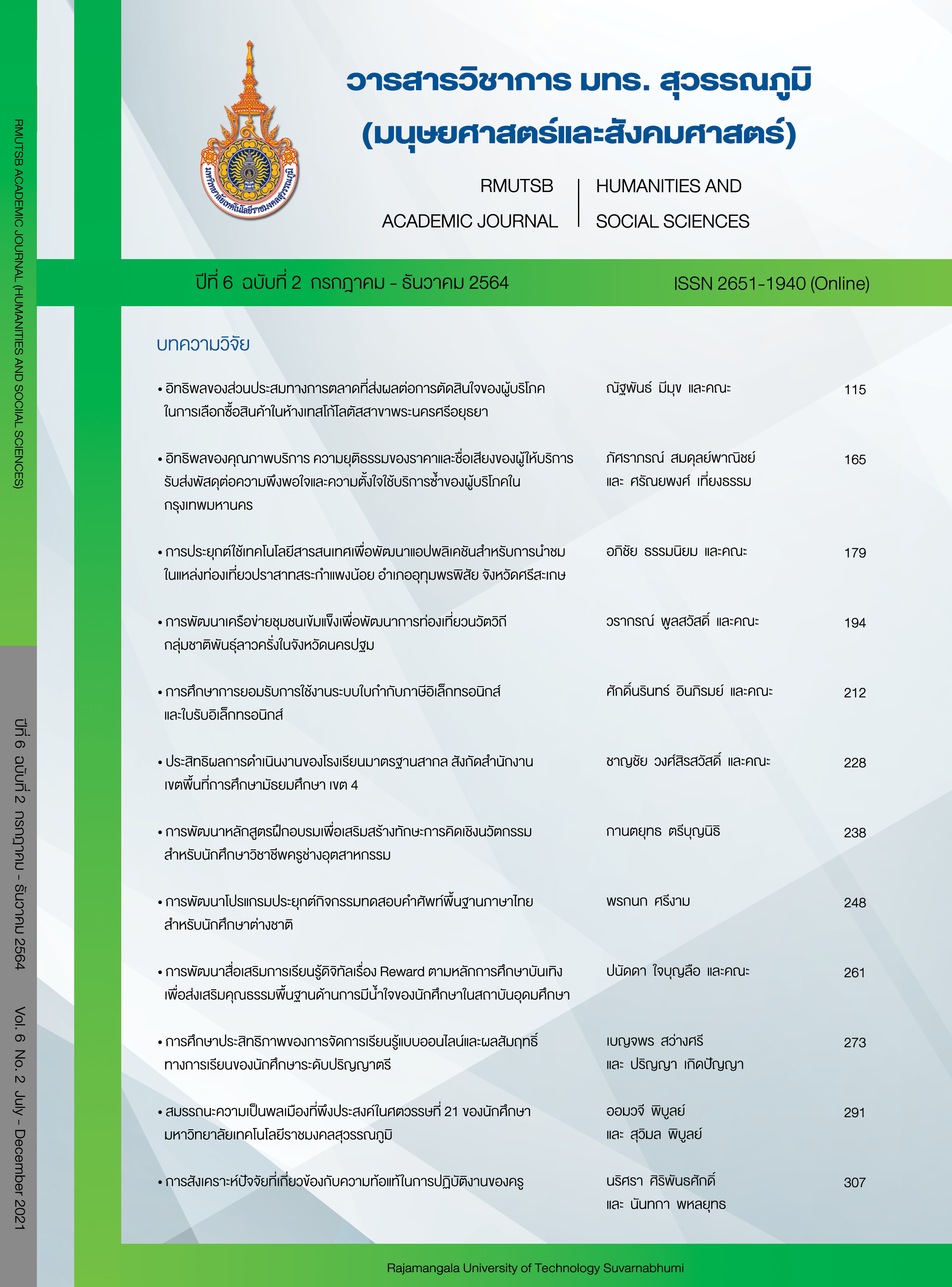Synthesis of factors correlating with burnout of teachers
Main Article Content
Abstract
The purpose of the research was to synthesize factors correlating with burnout of teachers. The samples of the research were fourteen quantitative researches, selected with purposive criterion regarding to factors correlating with burnout of teachers, published between 2009-2019. The instruments used were research quality evaluation forms and research records with an index of item-objective congruence score of 0.67-1.00. The statistics used were mean, standard deviation, and correlation coefficient. The results of the research found that the factors correlating with burnout of teachers were as follows: administer factors (r=-0.58) and positive psychological factors (r=-0.45), which were negatively correlated with burnout at a moderate level, social factors (r=-0.32), which were negatively correlated with burnout at a low level, work factors, which were negatively correlated with burnout a very low level (r=-0.15), and negative psychological factors (r=0.53) which were negatively correlated with burnout at a moderate level. The prime factors with the highest correlation coefficient in each variable were leadership behavior (r=-0.77) and work engagement (r=-0.65), which were negatively correlated with burnout at a high level. Three more factors were, supervisors’ support (r=-0.53), which was negatively correlated with burnout at a moderate level, work experience (r=-0.18), which was negatively correlated with burnout at a very low level, and role ambiguity (r=0.83), which was negatively correlated with burnout at a very high level.
Article Details
References
Buosonte, R. (2013). Mixed methods in research and evaluation. Bangkok: Chulalongkorn University. (in Thai)
Dandee, W. (2010). Factors affecting the burnout of teacher under the Loei Educational Service Area Office Loei1 (Master’s thesis). Loei Rajabhat University, Loei. (in Thai)
Jitanan, B. (2006). Research in society. Bangkok: Thammasat University. (in Thai)
Jongwisan, R. (2020). Industrial psychology. Bangkok: Chulalongkorn University.
Kaewmuangkom, K. (2011). Leadership behavior of school administrators affecting the burnout of elementary school teachers under the jurisdiction of Leamchabang municipality in Chonburi (Master’s thesis). Burapha University, Chon buri. (in Thai)
Maslach, C. (1978). The client role in staff burn-out. Journal of Social Issues, 34(4), 111-124.
Morakotsit, P. (2009). Human resource and development organization. Human Resource and Organization Development Journal, 55(1), 88-102. (in Thai)
Pakdeecharoen, P. (2009). A causal model and effects of burnout of teachers in Bangkok: A quantitative and qualitative study (Master’s thesis). Chulalongkorn University, Bangkok. (in Thai)
Pranee, K. (2016). A causal relationships between Job resources, proactive coping, work engagement, and burnout of secondary school teachers (Master’s thesis). Burapha University, Chon buri. (in Thai)
Sanamat, P. (2009). Factors affecting job burnout of the teachers in schools under the Office of Nongbualamphu Educational Service Area 2 (Master’s thesis). Loei Rajabhat University, Loei. (in Thai)
Siripantasak, N., Buaurai, N., Paweenbampen, P., & Laowong, P. (2021). A causal relationship model of burnout for secondary school teachers. The Proceedings of the 59th Kasetsart University Annual Conference, Education Humanities and Social Sciences (pp. 364-374). Bangkok: Kasetsart University. (in Thai)
Suntrayuth, T. (2013). Organization theory and behavior method theory research and education practicum in education. Bangkok: Netikun Printing House. (in Thai)
Tanyarattanasrisakul, M. (2017). The professional learning community: Practices guidelines for teachers. RMUTSB Academic Journal (Humanities and Social Sciences), 2(2), 214-228. (in Thai)
Thabprom, M., & Puangyanee, S. (2017). Factors influencing performance effectiveness of support staff at Rajamangala University of Technology Suvarnabhumi. RMUTSB Academic Journal (Humanities and Social Sciences), 2(1), 16-32. (in Thai)
Wiratchai, N. (1999). Meta-analysis. Bangkok: Chulalongkorn University. (in Thai)
Wongsarat, T. (2012). Predicting variables to burnout of teachers under Nan Primary Educational Service Area Office 1 (Master’s thesis). Kasetsart University, Bangkok. (in Thai)


